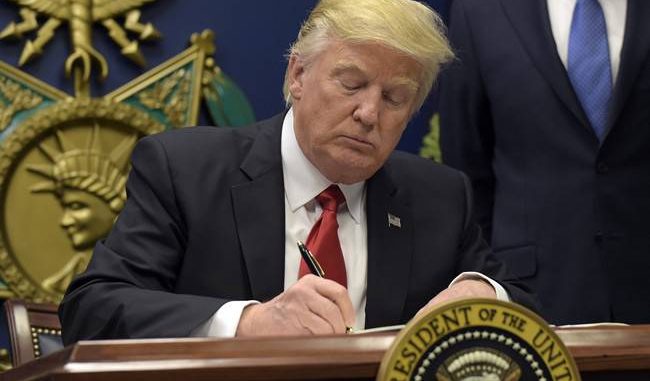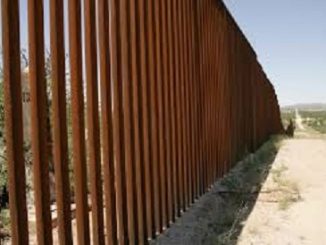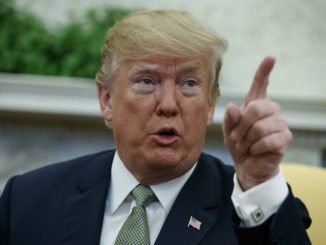
A federal appeals court will hear arguments Tuesday at 6 p.m. Eastern on whether to restore President Donald Trump’s controversial immigration order, which a lower court judge has temporarily put on hold. The scheduling of the hearing came as Justice Department lawyers on Monday made what is likely their final pitch to a federal appeals court to immediately restore President Trump’s controversial immigration order, while tech companies, law professors and former high-ranking national security officials joined a mushrooming legal campaign to keep the measure suspended.
“The Executive Order is a lawful exercise of the President’s authority over the entry of aliens into the United States and the admission of refugees,” Justice Department lawyers wrote.
The future of Trump’s temporary travel ban now lies with a panel of judges at the U.S. Court of Appeals for the 9th Circuit. A lower federal judge in Seattle had ordered a halt to the ban on Friday, and the appeals court over the weekend declined to upend that ruling before hearing more arguments.
With the court case ongoing, those once stopped from coming to the United States have rushed to come into the country. The Department of Homeland Security said it was suspending all enforcement of Trump’s directive after the federal judge in Seattle ordered it frozen, and many travelers have since been able to reunite with family here.
The broad legal issue is whether Trump exceeded his authority and violated the First Amendment and federal immigration law, and whether his barring refugees and those from seven Muslim-majority countries from entering the United States imposes irreparable harm on those it affects.
Either Justice Department lawyers representing the Trump administration, or the states of Washington and Minnesota – which had successfully sued to put the ban on hold – could ask the Supreme Court to intervene if they disagree with the appeals court decision. The Supreme Court, though, remains one justice short, and many see it as ideologically split 4-4. A tie would keep in place whatever the appeals court decides.
The rhetoric from both sides has been fierce. The states of Washington and Minnesota argued in a filing Monday that reinstating the ban would “unleash chaos again” by “separating families, stranding our university students and faculty, and barring travel.”
Trump said Monday, during remarks at MacDill Air Force Base in Tampa, that, “We need strong programs so that people that love us and want to love our country and will end up loving our country are allowed in, not people who want to destroy us and destroy our country.”
Federal immigration law undeniably gives the president broad authority to bar people from coming into the United States, saying that if he finds “the entry of any aliens” would be “detrimental” to the country’s interests, he can impose restrictions. Legal analysts have said those challenging the ban will face an uphill climb to overturn it.
Yet the opposition has been successful so far, and it is growing. On Monday, ten former high-ranking diplomatic and national security officials; nearly 100 Silicon Valley tech companies; more than 280 law professors; a coalition of 16 state or district attorneys general, including those from Washington, D.C., Maryland and Virginia; and a host of civil liberties and other organizations formally lent their support to the legal bid to block Trump’s order.
While it is not unusual for outside parties to weigh in on legal cases of such public interest, the breadth and depth of those lining up behind Washington and Minnesota is notable.
Former secretaries of state John Kerry and Madeleine Albright, along with former CIA director Leon Panetta, former CIA and National Security Agency Director Michael Hayden and other former top national security officials, attached their names to an affidavit declaring there was “no national security purpose” for a complete barring of people from the seven affected countries.
“Since September 11, 2001, not a single terrorist attack in the United States has been perpetrated by aliens from the countries named in the Order,” the group declared. “Very few attacks on U.S. soil since September 11, 2001 have been traced to foreign nationals at all.”
Apple, Facebook, Google, Microsoft, Netflix, Twitter, Uber and others asserted in a brief that Trump’s order “hinders the ability of American companies to attract great talent; increases costs imposed on business; makes it more difficult for American firms to compete in the international marketplace; and gives global enterprises a new, significant incentive to build operations – and hire new employees – outside the United States.”
And 16 attorneys general said, while their specific businesses and residents were different, “all stand to face the concrete, immediate, and irreparable harms caused by the Executive Order.”
Trump and his supporters have continued to press the case that the short-term stoppage on refugees and immigrants from Iraq, Iran, Syria, Libya, Somalia, Sudan and Yemen is necessary for national security reasons. Trump went so far as to suggest on Twitter that if an attack were to happen, the judiciary would be to blame.
“Just cannot believe a judge would put our country in such peril,” Trump wrote. “If something happens blame him and court system. People pouring in. Bad!”
The president also dismissed as “fake news” polls showing opposition to the executive order and asserted that the public wants and needs border security and strong vetting.
Federal courts in New York, California and elsewhere already have blocked aspects of the ban from being implemented, although one federal judge in Massachusetts declared that he did not think that challengers had demonstrated that they had a high likelihood of success. The case before the 9th Circuit, though, is much broader than the others, because it stems from a federal judge’s outright halting of the ban.
By: THE WASHINGTON POST
Source:
Federal appeals court decides to schedule a hearing on Trump travel order





Be the first to comment